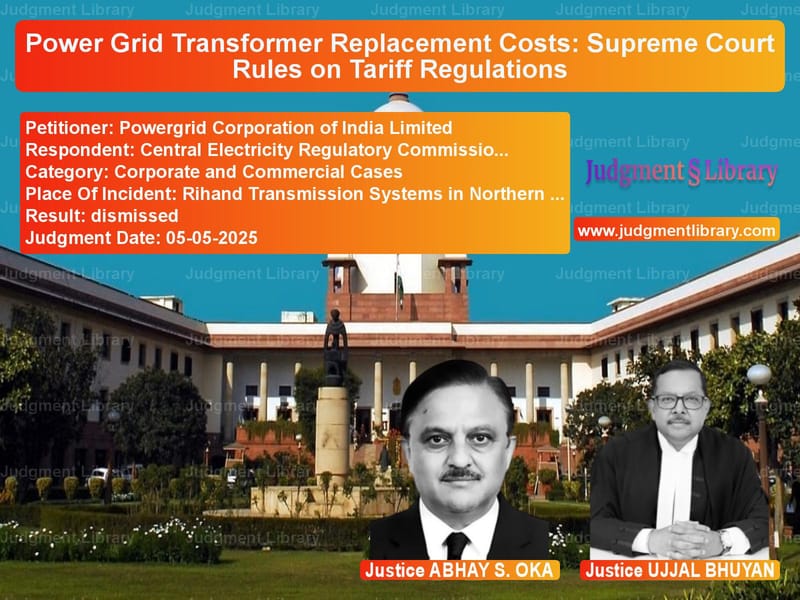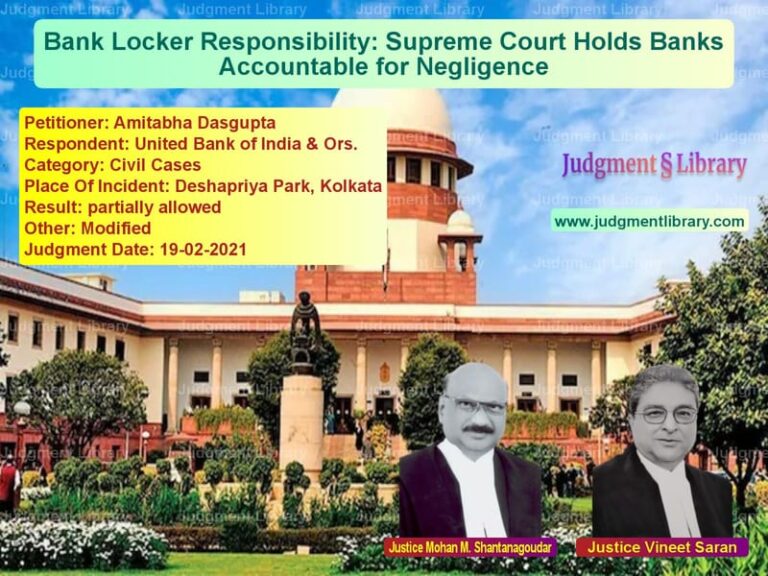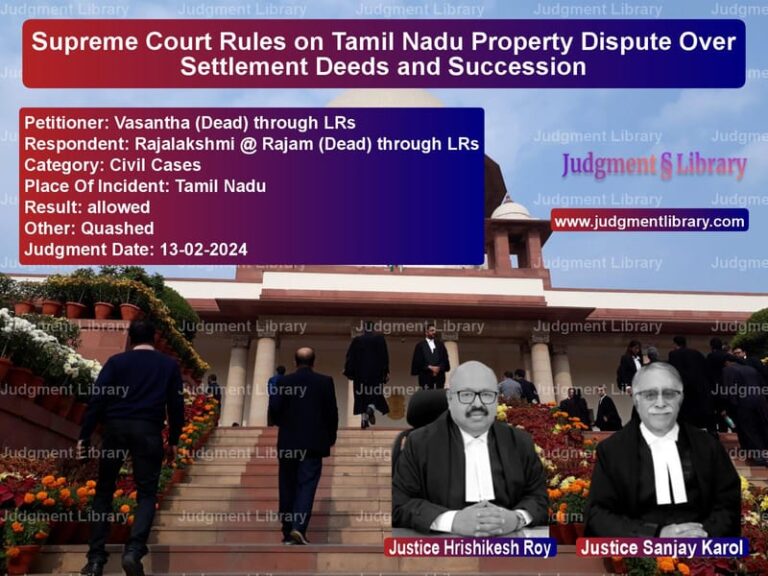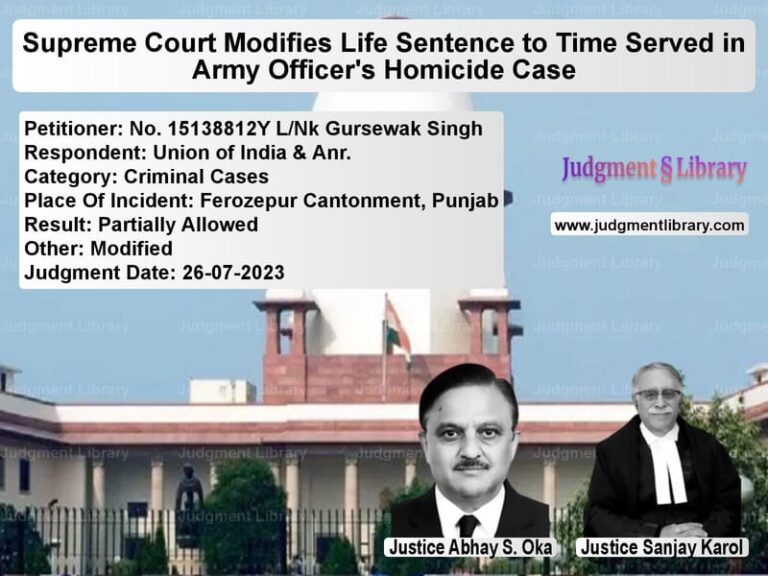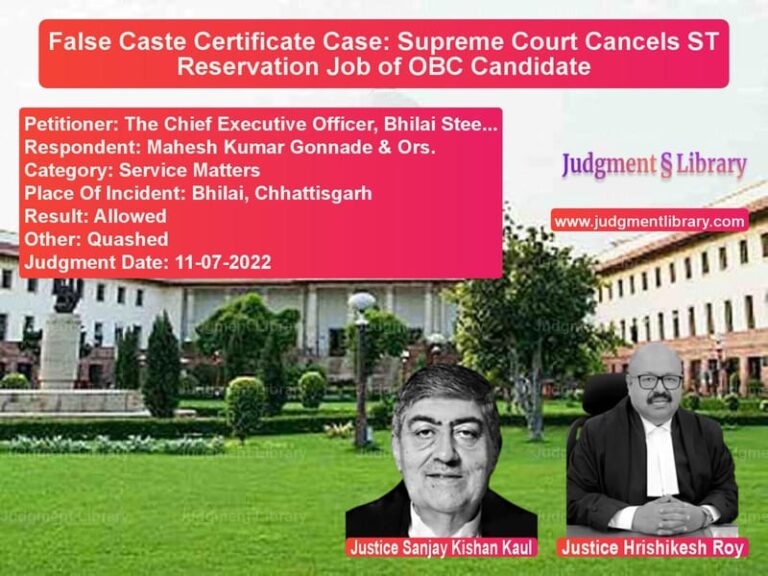Power Grid Transformer Replacement Costs: Supreme Court Rules on Tariff Regulations
In a significant ruling that clarifies the interpretation of tariff regulations in the electricity sector, the Supreme Court of India has dismissed appeals by Power Grid Corporation of India Limited regarding claims for additional capitalization for replacement of damaged transformers. The case, which involved complex questions of electricity tariff regulations and insurance coverage, saw the court upholding the decisions of both the Central Electricity Regulatory Commission and the Appellate Tribunal for Electricity.
The dispute centered around three Inter-connecting Transformers (ICTs) in Power Grid’s Rihand I transmission system that failed and burned down between April and May 2006 during peak summer season. With high anticipated load demand in the National Capital Territory of Delhi, Power Grid took emergency measures by temporarily diverting transformers from other substations to restore operations. The corporation subsequently sought approval from regulatory authorities for additional capitalization to cover the costs of these replacements, claiming that the damaged transformers required decapitalization and the new installations warranted additional capitalization under the tariff regulations.
When the Central Electricity Regulatory Commission rejected these claims, Power Grid approached the Appellate Tribunal for Electricity, which also dismissed the appeals. The corporation then moved the Supreme Court, arguing that the regulatory bodies had misinterpreted the relevant provisions of the Tariff Regulations and that the replacement costs should not be covered by their self-insurance policy.
The Legal Battle Over Additional Capitalization
Power Grid’s counsel made several key arguments before the Supreme Court. They contended that “Appellate Tribunal had virtually rubber stamped the findings arrived at by the CERC” and had interpreted “Regulation 53(2)(iv) and Note 2 of the Tariff Regulations in a most illogical manner.” The counsel argued that if this interpretation were accepted, “no transmission licensee will ever get additional capitalization on restoration and replacement of the ICTs.”
The corporation claimed significant financial implications, stating that “appellant has been denied Rs. 15.63 crores on account of capitalization and Rs. 4.58 crores on account of tariff qua Rihand I transmission system and Rs. 3.54 crores on account of capitalization qua Rihand II transmission system.”
On the technical aspects, Power Grid’s counsel emphasized that “any work that may be required to be done by a transmission licensee for successfully operating the transmission system is permissible expenditure for capitalization, whether it is a new work or a replacement.” They argued that any other interpretation would render the provisions meaningless, particularly Note 2 of the regulations.
The respondents, representing various beneficiaries of the transmission system, strongly supported the regulatory commissions’ decisions. They argued that “appellant under the statute is under an obligation to maintain a healthy transmission system” and that “for maintenance of the transmission system, the beneficiaries are not required to pay additional amount.”
The beneficiaries contended that “the very concept of additional capitalization is based on the premise that in case any additional benefit is given to the beneficiaries, the amount can be capitalized” and that by replacement of the failed transformers, “no additional benefit is given to the beneficiaries.”
Court’s Analysis of Tariff Regulations
The Supreme Court meticulously examined Regulation 53 of the Central Electricity Regulatory Commission (Terms and Conditions of Tariff) Regulations, 2004, which deals with additional capitalization for inter-state transmission systems. The regulation provides specific circumstances under which additional capital expenditure can be admitted by the commission, including deferred liabilities, works deferred for execution, compliance with arbitral awards or court orders, and changes in law.
Most importantly, Regulation 53(2)(iv) allows for “any additional works/services which have become necessary for efficient and successful operation of the project, but not included in the original project cost.”
The court noted that Note 2 to Regulation 53 specifically states that “any expenditure on replacement of old assets shall be considered after writing off the entire value of the original assets from the original capital cost.”
In its crucial analysis, the court observed that “Regulation 53 does not include within its scope replacement of ICTs due to damage or failure.” The judges found that Power Grid’s actions constituted mere replacement rather than additional work, stating that “all that the appellant had done was diversion and replacement of ICTs. This cannot be construed as doing any additional work/services.”
The court concurred with the respondents’ position that “as a central transmission utility, it was the duty of the appellant to maintain a healthy transmission system; replacement of damaged equipment(s) is part of operation and maintenance.”
Regarding the age of the assets, the court noted that “both Rihand I and Rihand II cannot be considered as old assets as these were fairly new” and there was nothing on record to show that the transmission systems were in bad shape or had started wearing out prior to the breakdown.
The Self-Insurance Policy Controversy
A significant aspect of the case involved Power Grid’s self-insurance reserve policy, which the corporation had adopted in the fiscal year 1994-1995. The policy was created to allocate estimated appropriations for future losses potentially arising out of uninsured risks, including machinery breakdown and fire risk of equipment in operational sub-stations.
Power Grid argued that it could not take finance from the self-insurance reserve because “the cause of the loss to the ICTs was damage due to machinery breakdown leading to fire. It is not the fire itself which damaged the ICTs.”
The court found this contention contradictory and examined the principle of ‘proximate cause’ as established in the New India Assurance Company Limited Vs. Zuari Industries Limited case. In that precedent, the court had analyzed that “the proximate cause is not the cause which is nearest in point of time or place but the active and efficient cause that sets in motion a train or chain of event which brings about the ultimate result without the intervention of any other force working from an independent source.”
Applying this principle to the current case, the Supreme Court determined that “the proximate cause for the damage to the ICTs is the implosion/explosion in the internal/external machinery of the ICTs which caused fire.” The court noted that “all the three ICTs became unserviceable due to the fire” and that the corporation itself had admitted that preventive maintenance and checks were done regularly and everything was functioning fine until the fire broke out.
The court thus concluded that “the self-insurance policy of the appellant covered the cost of replacement of the damaged ICTs” and that the Appellate Tribunal was justified in directing Power Grid to finance the net cost from the self-insurance fund reserve as part of operation and maintenance charges.
Broader Implications and Final Ruling
The Supreme Court’s decision has significant implications for the electricity transmission sector in India. It clarifies that routine replacements of damaged equipment, even when unexpected and costly, fall under the normal operation and maintenance responsibilities of transmission utilities rather than qualifying for additional capitalization that would ultimately be passed on to consumers through tariff increases.
The judgment reinforces the principle that utilities must maintain adequate insurance or self-insurance reserves for such contingencies and cannot routinely seek to transfer these costs to beneficiaries through the tariff mechanism.
In its final analysis, the court rejected Power Grid’s argument that the Appellate Tribunal had merely rubber-stamped the CERC’s decision, noting that “Appellate Tribunal has given cogent and valid reasons while rejecting the appeals of the appellant.”
The court ultimately found that “the two appeals are devoid of any merit” and dismissed them with no order as to costs. The ruling provides important clarity on the interpretation of tariff regulations and establishes that replacement of damaged equipment, without any additional benefit to consumers, does not qualify for additional capitalization under the current regulatory framework.
This decision underscores the balance that regulatory authorities must maintain between ensuring the financial viability of transmission utilities and protecting electricity consumers from bearing costs that should properly be covered by the utilities’ operational budgets and insurance arrangements.
Petitioner Name: Powergrid Corporation of India Limited.Respondent Name: Central Electricity Regulatory Commission & Ors.Judgment By: Justice ABHAY S. OKA, Justice UJJAL BHUYAN.Place Of Incident: Rihand Transmission Systems in Northern Region.Judgment Date: 05-05-2025.Result: dismissed.
Don’t miss out on the full details! Download the complete judgment in PDF format below and gain valuable insights instantly!
Download Judgment: powergrid-corporatio-vs-central-electricity-supreme-court-of-india-judgment-dated-05-05-2025.pdf
Directly Download Judgment: Directly download this Judgment
See all petitions in Corporate Compliance
See all petitions in Company Law
See all petitions in Corporate Governance
See all petitions in unfair trade practices
See all petitions in Bankruptcy and Insolvency
See all petitions in Judgment by Abhay S. Oka
See all petitions in Judgment by Ujjal Bhuyan
See all petitions in dismissed
See all petitions in supreme court of India judgments May 2025
See all petitions in 2025 judgments
See all posts in Corporate and Commercial Cases Category
See all allowed petitions in Corporate and Commercial Cases Category
See all Dismissed petitions in Corporate and Commercial Cases Category
See all partially allowed petitions in Corporate and Commercial Cases Category

